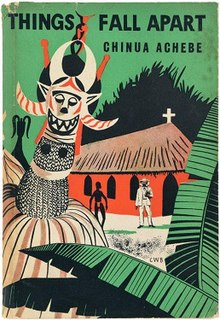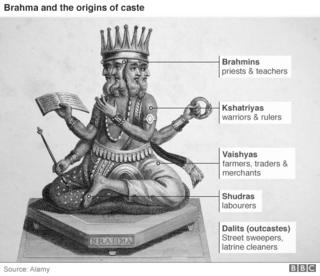A Sense of Doubt blog post #1483 - Ethnocentrism and World Views - More HUM 351 Posts
And so another post in my continuing series of material from the Humanities 351 class I am teaching at Concordia University, Portland.
This is a quickie because, you know, GRADING HELL, but then what else is new.
Here's the work:
HUM
351
Challenges of Global
Diversity
Week 4
It seemed as if the world had gone mad.
~
Chinua Achebe
Introduction
This week we continue
our exploration of Igbo culture and how some Indigenous peoples experienced the
European colonization of Africa.
Investigate alternative
points of view or consider additional resources on your own as we move along
through the required novel and the films, if you choose. Enjoy this week’s
materials and contact the instructor if you have any questions.
Read
·
Things
Fall Apart (Achebe, 1994)
View
·
Africa:
The Story of a Continent (Davidson, 2000) [Video] [Closed captioned]
Note: Watch Episode 5 -The Bible and the Gun and Episode 6 -This Magnificent African Cake. Both episodes are available on YouTube [Episode 5, Episode 6] and for purchase on Amazon. They may also be available at the CU library and through other libraries or services.
Note: Watch Episode 5 -The Bible and the Gun and Episode 6 -This Magnificent African Cake. Both episodes are available on YouTube [Episode 5, Episode 6] and for purchase on Amazon. They may also be available at the CU library and through other libraries or services.
Post to Discussion
Board: Week 4 – Responses and Worldviews
Initial Post (Due
Tuesday)
In your discussion board
post, respond to the questions posed below. Use specific details from the text
and film to support your answer. Include direct quotations where appropriate.
Feel free to include additional relevant personal observations, stories, and
experiences.
·
What do you think about
the range of African responses to colonization portrayed
in Things Fall Apart and Africa: The Story of a
Continent? Be specific.
·
What do you think about
the range of European values, ideas, and goals depicted
in Things Fall Apart and Africa: The Story of a
Continent? Be specific.
I am
glad that ethnocentrism struck a chord. Yes, isn't the cultural chasm that
breeds ethnocentrism much the same as the class system based on wealth and
status in America, even though, we do not have a class system, say like the
Hindu caste system of India. The system was as unjust as American capitalism
and greed without the illusion of the "American Dream," which lies to
the populace that there is a way out of the crushing poverty for EVERYONE.
Isn't it more than
just judging people for their salary instead of who they are? Isn't the salary
the means to get the nicest place to live, the creation we all crave, the
luxury we all want, and to be able to fulfill desires with immediate
gratification? As an aside, I think immediate gratification brought on by
the access technology provides is one of the most serious modern problems we
all face that few want to admit is a problem.
Isn't American
class system characterized by the all but impenetrable 1% of the 1%?
Isn't that the last
bastion of the staunchest racists, sexists, homophobes?
Great source use and as we
discussed you added some extra sources to relate the African-European dynamic
to the colonization of Hawai’i.
Note on source use. You need a
bit more than a URL. Name pages. Look at this
I love the way you related the
two colonization situations as Hawai’i’s situation has many parallels.
Just a note on writing
correctness: 1800s. Never 1800's. It is a simple plural: 1800s.
I like that you are
investigating a new question about “chosen response” in regards to how Africans
reacted to the arrival of white Europeans.
You have some very good
analysis here and are using sources well. As I have stated elsewhere, I think a
single and unified thesis works better for these questions rather than creating
separate answers and following a more rote method such as questions-answers
homework.
I like your second half very
much, but for simplicity, I am just going to focus on your first half.
I am a bit confused as to what
you are suggesting. Are you saying that these African people (a lot of varied
cultures about which we are generalizing surely), did not have the free will
and resolve to choose how they responded to the coming of Europeans?
What is your evidence for this?
You share the example
from Things Fall Apart that Okonkwo leads the attack on the European Christians; how is
this not choosing their response?
So, you state this, and I am
not sure what you mean:
“This is exactly why I would
argue whether or not certain African’s responses were even taken into account
about European influence.”
Taken into account by whom?
Achebe? Those making the documentary?
Perhaps you are grappling with
the conversion issues that turned brother against brother:
“How do you think we can fight
when our own brothers have turned against us?”
and
“They have broken the clan and
gone their several ways... our brothers have deserted us and joined a stranger
to soil their fatherland. If we fight stranger, we shall hit our own
brothers...”
So is this what you are talking
about? Africans choosing not to fight so as not to strike against their own
people?
You have made intriguing
points, but I seem to lack clarity.
Good job!
This is an amazing
1000+ words on the issues of colonialization with strong source use. Two
immediate recommendations:
- don’t forget italics with
titles, such Things Fall Apart.
- consider adding an extra
source or two when you compose these short essays
It’s better to write a short essay unified by a single thesis for these
responses rather than answering each question in turn, which feels more like
answering questions in the back of a textbook than writing a critical analysis
of material we’re watching and reading.
I want to hone right in on one
of your quotes from Africa:
A Voyage of Discovery. Which
episode does this quote come from? The episode title would be in quotes and
might be used as the in-text cite.
But thanks for the time stamp!!
“What the African inhabitants
might think was never asked. The European idea in the words of one British
colonizer was to seize African territory and then to rule the country as there
were no inhabitants. They were thought of as children and justified taking
their land by calling them lazy savages.”
 This idea of parents and
children – this sure is TOUGH LOVE – and the regard of the African peoples as
“lazy savages” goes right to the heart of the European ideas about them.
This idea of parents and
children – this sure is TOUGH LOVE – and the regard of the African peoples as
“lazy savages” goes right to the heart of the European ideas about them.
But saying that the Europeans
“mistreated them greatly” is definitely putting it mildly. I think you are on
the right track as you delve into Things Fall Apart and
go at the ideology here: “African people were “savages” and “uncultured” humans
that needed to be taught a better way of life. Not only did they take land, but
they then built a government, and expected the native people to follow their
rules as well.”
You earlier connected to the
paternal idea. But what other analogies for the relationship can we make?
This belief that the European
way of life was “right” and that all other ways of life were wrong, what do we
call that? There’s a word for it: ethnocentrism.
But even ethnocentrism glosses
that abuses, horrors, devastation, and terror inflicted on the people
throughout Africa.
What else can we say about
ethnocentrism?
What other superior-inferior
relationship is like this parent-child image?
As I have shared in previous
announcements, as much as possible, it’s better to write a unified post with a
thesis and a more than topic rather than this rote Q&A old school homework
method. For our DB2 on Mindwalk, the Q&A seemed all right for the material, especially as
many might grapple with making a thesis from the overwhelming content of that
film. However, from now on, it may be better to make a thesis and write a short
essay rather than simply answering questions.
Thanks for giving me this
teaching moment. You’re the first response I am making this week, so I may
reference this post to other students.
As for your content, you start
with a description of African disbelief at the rumors of the white man’s
abilities, but then you do not really do much more with this topic. Isn’t there
quite a bit more to the “response” by the Igbo than disbelief? Isn’t that the
whole message of last third of the book Things Fall Apart?
I like the quote you share in
your second half: “He saw things as black and white. And black was evil.
He saw the word as a battlefield in which the children of light were locked in
mortal conflict with the sons of darkness” (Achebe, 1958, p.184).
Good.
So what values and ideas does
this quote express?
It’s more than just no respect
and more regard. The meaning is much deeper and goes to not only the nature of
their humanity but of their very souls.
+++++++++++++++++++++++++++++++++++++++++++++++++++++++++++++++++++++++
+++++++++++++++++++++++++++++++++++++++++++++++++++++++++++++++++++++++
- Bloggery committed by chris tower - 1903.14 - 10:10
- Days ago = 1348 days ago
- New note - On 1807.06, I ceased daily transmission of my Hey Mom feature after three years of daily conversations. I plan to continue Hey Mom posts at least twice per week but will continue to post the days since ("Days Ago") count on my blog each day. The blog entry numbering in the title has changed to reflect total Sense of Doubt posts since I began the blog on 0705.04, which include Hey Mom posts, Daily Bowie posts, and Sense of Doubt posts. Hey Mom posts will still be numbered sequentially. New Hey Mom posts will use the same format as all the other Hey Mom posts; all other posts will feature this format seen here.






No comments:
Post a Comment